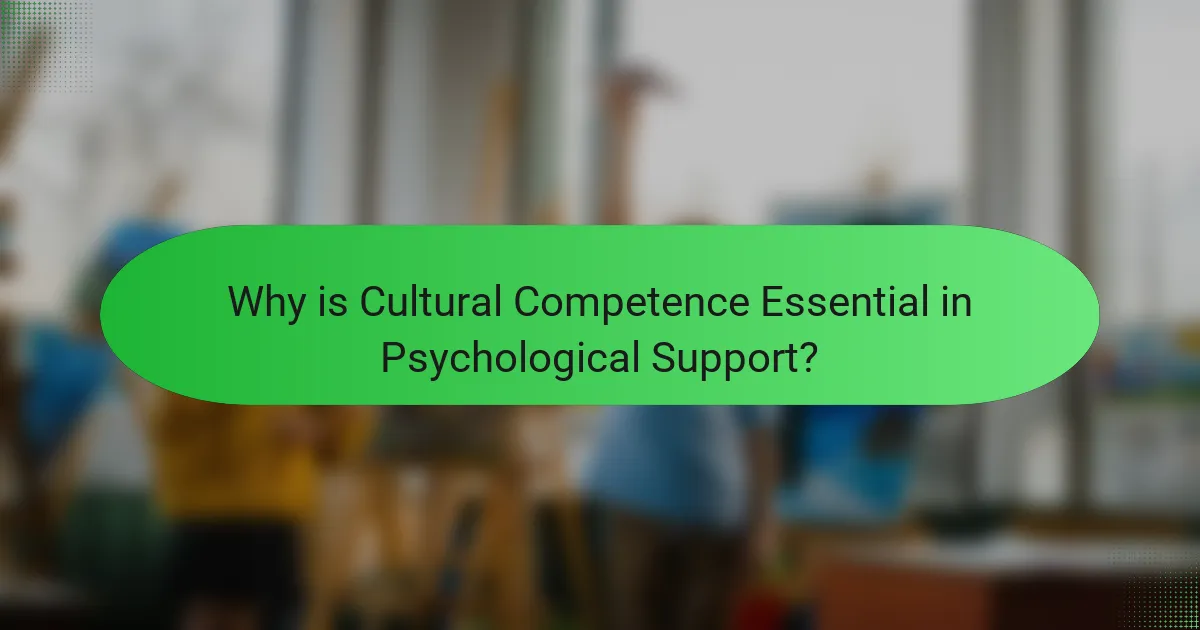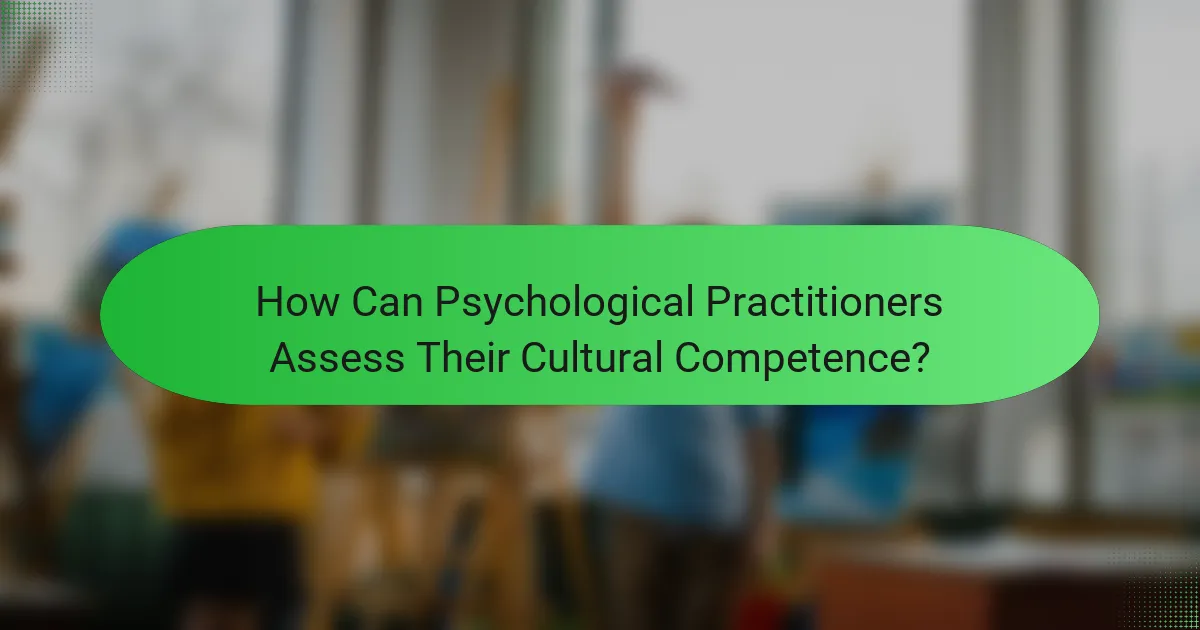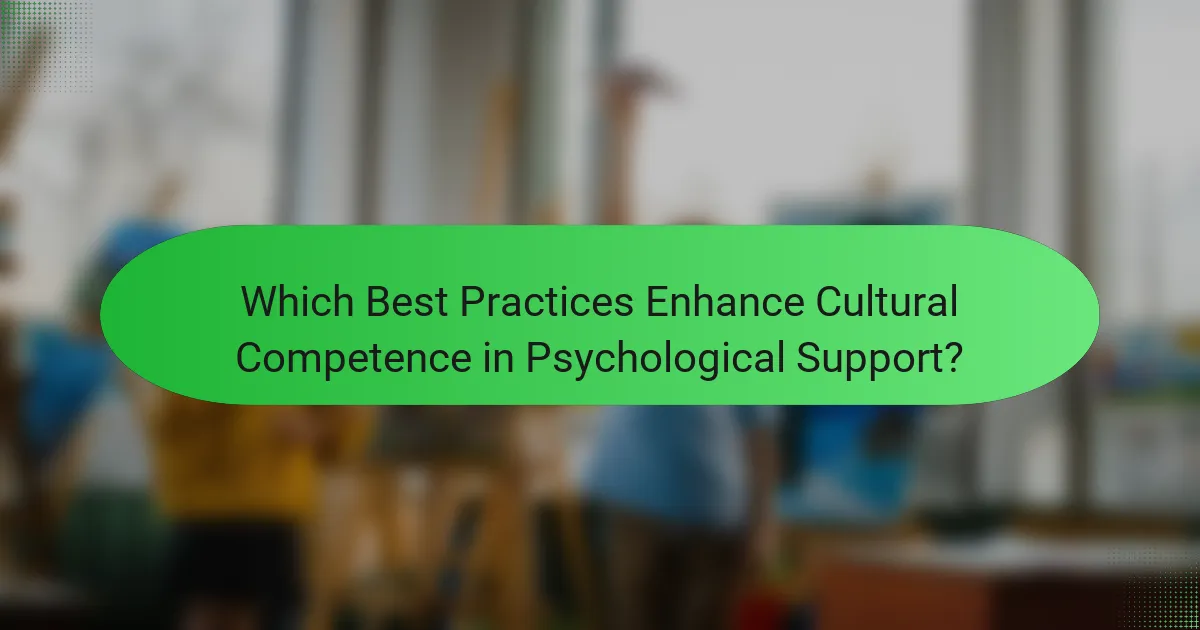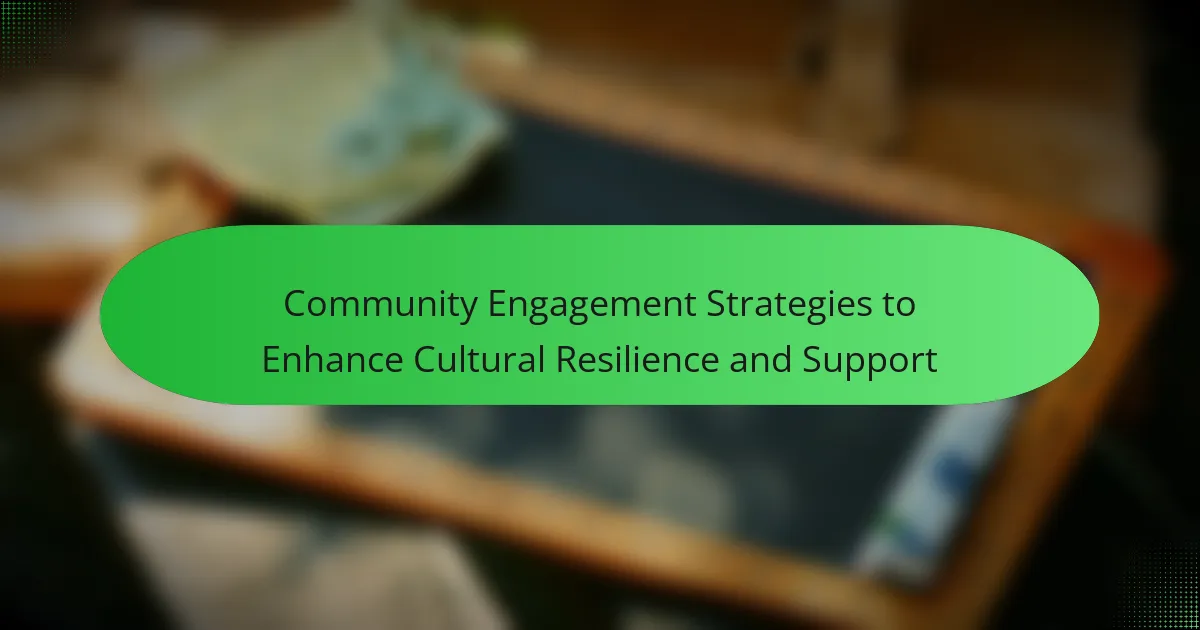Cultural competence in psychological support is crucial for enhancing trust and improving therapeutic outcomes in diverse communities. This article explores the core principles of awareness, knowledge, and skills; the regional variations that influence cultural competence; methods for practitioners to assess their competence; and strategies to foster effective psychological support through active listening and community engagement. Understanding these elements is essential for tailoring interventions that respect cultural values and practices.

Why is Cultural Competence Essential in Psychological Support?
Cultural competence is essential in psychological support because it enhances understanding and effectiveness in diverse communities. It promotes trust and rapport between practitioners and clients, leading to better therapeutic outcomes. Practitioners who are culturally competent can recognize and address unique cultural factors influencing mental health. This understanding helps in tailoring interventions that respect cultural values and practices, ultimately improving client engagement and satisfaction.
How does cultural background influence mental health perceptions?
Cultural background significantly shapes mental health perceptions by influencing beliefs, stigma, and coping strategies. Diverse communities may view mental health issues through various lenses, affecting access to care and treatment acceptance. For example, collectivist cultures often prioritize family involvement in mental health discussions, while individualistic cultures may emphasize personal responsibility. This cultural lens can lead to unique attributes in understanding mental health, such as varying definitions of wellness and illness across cultures. Additionally, cultural stigma can deter individuals from seeking help, highlighting the need for culturally competent psychological support.
What are the benefits of culturally competent psychological practices?
Culturally competent psychological practices enhance mental health outcomes for diverse communities. They foster trust, improve communication, and increase engagement in treatment, leading to better adherence and satisfaction. These practices acknowledge unique cultural backgrounds, addressing specific needs and reducing stigma. As a result, clients experience more effective support and holistic care tailored to their cultural contexts.
Which challenges arise in delivering psychological support across diverse communities?
Delivering psychological support across diverse communities faces several challenges. These include cultural misunderstandings, language barriers, and varying perceptions of mental health.
Cultural misunderstandings can lead to misinterpretations of behaviors and emotional expressions. Language barriers hinder effective communication, making it difficult to convey feelings and needs. Additionally, differing cultural beliefs about mental health can affect how individuals seek help and engage with services.
Providers must develop cultural competence to navigate these challenges. This involves understanding the unique attributes of each community, such as their values, traditions, and social dynamics. A culturally sensitive approach enhances trust and fosters better therapeutic relationships.
As a result, addressing these challenges is crucial for effective psychological support in diverse communities.

What Core Principles Underpin Cultural Competence in Psychology?
Cultural competence in psychology is underpinned by principles of awareness, knowledge, and skills. Awareness involves recognizing one’s own cultural biases. Knowledge encompasses understanding diverse cultural backgrounds and their impacts on mental health. Skills refer to the ability to communicate effectively and provide appropriate support to individuals from various cultures. These core principles foster trust and enhance therapeutic relationships, ultimately leading to better mental health outcomes for diverse communities.
How do awareness and knowledge enhance cultural competence?
Awareness and knowledge significantly enhance cultural competence by fostering understanding and respect for diverse backgrounds. Increased awareness allows individuals to recognize their own biases and assumptions, promoting empathy. Knowledge of cultural norms and values equips professionals to provide tailored psychological support. This understanding leads to more effective communication and trust-building, essential for successful interventions. As a result, culturally competent practitioners can better address the unique needs of diverse communities, improving mental health outcomes.
What role does sensitivity play in psychological support?
Sensitivity plays a crucial role in psychological support by fostering trust and understanding. It enables practitioners to connect with clients from diverse backgrounds, enhancing the therapeutic relationship. Sensitivity allows for the recognition of unique cultural contexts and individual experiences, which is vital for effective communication. Practitioners who demonstrate sensitivity can better address the specific needs and concerns of their clients, leading to more personalized and effective support. This approach can significantly improve outcomes in psychological interventions across various communities.
How can practitioners develop effective communication skills with diverse populations?
Practitioners can develop effective communication skills with diverse populations by enhancing cultural competence. This involves understanding cultural differences, actively listening, and adapting communication styles to meet the needs of individuals. Training in cultural awareness can improve empathy and reduce misunderstandings. Engaging with diverse communities fosters trust and promotes more effective psychological support. Regular self-reflection on biases and assumptions further strengthens communication skills.

What Unique Attributes Define Cultural Competence in Different Regions?
Cultural competence varies by region, influenced by local customs, values, and historical contexts. Unique attributes defining cultural competence include language proficiency, understanding of social norms, and awareness of community-specific mental health practices. For instance, in collectivist societies, psychological support may prioritize family involvement, while in individualistic cultures, personal autonomy is emphasized. Additionally, awareness of historical traumas, such as colonialism or migration patterns, shapes culturally competent practices. These attributes enhance the effectiveness of psychological support across diverse communities.
Which cultural factors are significant in psychological practices in Western contexts?
Cultural factors significantly impacting psychological practices in Western contexts include individualism, communication styles, and attitudes toward mental health. Individualism emphasizes personal autonomy, influencing therapeutic approaches that prioritize self-exploration. Communication styles reflect directness and assertiveness, affecting client-therapist interactions. Attitudes toward mental health can vary, with stigma present in some communities, impacting help-seeking behavior. Understanding these factors enhances cultural competence in psychological support.
How do Eastern cultural values shape psychological support approaches?
Eastern cultural values significantly influence psychological support approaches by emphasizing community and holistic well-being. These values prioritize family involvement and social harmony, shaping how mental health is perceived and treated.
For example, collectivist cultures often focus on group dynamics rather than individual issues, leading to support systems that integrate family and community resources. This contrasts with Western approaches that may prioritize individual therapy.
Additionally, concepts such as mindfulness and spirituality, rooted in Eastern philosophies, inform therapeutic practices. Techniques like meditation and mindfulness-based stress reduction are increasingly integrated into psychological support, reflecting these cultural values.
In summary, understanding Eastern cultural values enhances cultural competence in psychological support, fostering more effective and respectful interactions with diverse communities.
What are the implications of indigenous practices on psychological support?
Indigenous practices significantly enhance psychological support by integrating cultural values and community involvement. These practices foster trust and understanding, which are vital in therapeutic settings.
Cultural competence in psychological support acknowledges the unique attributes of indigenous approaches, such as holistic healing and community-based interventions. Research shows that culturally tailored support improves mental health outcomes among diverse populations. For instance, incorporating indigenous rituals and beliefs can enhance the effectiveness of therapy, leading to stronger client-therapist relationships.
Moreover, indigenous practices often emphasize the importance of storytelling and connection to the land, which can provide a sense of belonging and identity. These elements serve as rare attributes that differentiate indigenous psychological support from mainstream methods. As a result, practitioners who embrace these practices can better address the psychological needs of indigenous individuals and communities.

How Can Psychological Practitioners Assess Their Cultural Competence?
Psychological practitioners can assess their cultural competence through self-reflection, feedback, and training. They should evaluate their understanding of diverse cultural backgrounds and their ability to apply this knowledge in practice.
1. Self-Assessment: Practitioners should reflect on their biases and awareness of cultural differences.
2. Client Feedback: Gathering input from clients about their experiences can provide valuable insights.
3. Continuous Education: Engaging in training focused on cultural competence enhances understanding and skills.
4. Peer Review: Collaborating with colleagues to discuss cultural challenges can foster growth and awareness.
These methods help ensure effective psychological support for diverse communities.
What tools and frameworks are available for self-assessment?
Various tools and frameworks exist for self-assessment in cultural competence. These resources help individuals evaluate their understanding and effectiveness in providing psychological support to diverse communities.
1. Cultural Competence Self-Assessment Checklist: A comprehensive tool that allows users to evaluate their skills and knowledge in cultural competence across various domains.
2. The Intercultural Development Inventory (IDI): A framework that assesses an individual’s intercultural competence and provides feedback for development.
3. Cultural Intelligence (CQ) Assessment: Measures an individual’s capability to function effectively in culturally diverse settings.
4. The Cultural Competence Assessment Tool (CCAT): Focuses on measuring knowledge, attitudes, and skills related to cultural competence in healthcare settings.
5. Online Training Modules: Many organizations offer online courses that include self-assessment components to gauge cultural competence.
6. Reflective Journaling: Encourages individuals to document their experiences and reflections on interactions with diverse populations, promoting self-awareness and growth.
How do feedback mechanisms enhance cultural competence in practice?
Feedback mechanisms significantly enhance cultural competence by promoting continuous learning and adaptation in psychological support practices. They allow practitioners to receive insights from diverse communities, leading to improved understanding and responsiveness to cultural nuances. Regular feedback fosters an environment of trust and collaboration, ensuring that interventions are relevant and effective. This iterative process strengthens the relationship between providers and clients, ultimately enhancing the quality of care for diverse populations.

Which Best Practices Enhance Cultural Competence in Psychological Support?
Cultural competence in psychological support is enhanced through active listening, ongoing education, and community engagement. Practitioners should prioritize understanding diverse cultural backgrounds and practices.
1. **Active Listening**: This fosters trust and allows clients to express their unique experiences and needs.
2. **Ongoing Education**: Regular training on cultural sensitivity equips professionals with the skills to address diverse client backgrounds effectively.
3. **Community Engagement**: Collaborating with local organizations helps practitioners understand cultural nuances and build rapport within communities.
4. **Personal Reflection**: Practitioners should reflect on their biases and assumptions to improve their cultural competence.
5. **Tailored Approaches**: Adapting therapeutic techniques to align with clients’ cultural values enhances the relevance and effectiveness of support.
What training programs exist for improving cultural competence?
Several training programs exist to enhance cultural competence in psychological support. These programs focus on understanding diverse cultural backgrounds and improving service delivery.
1. Cultural Competence Training Workshops: These workshops provide interactive learning experiences on cultural awareness and sensitivity.
2. Online Certification Courses: Many institutions offer online courses that cover theories and practical applications of cultural competence.
3. Community-Based Training Programs: These programs involve local communities to foster real-world understanding and engagement.
4. Continuing Education Seminars: Professional organizations frequently host seminars that address the latest research and best practices in cultural competence.
5. Specialized Graduate Programs: Some universities offer degree programs focused on multicultural psychology and cultural competence.
How can ongoing education and reflection support practitioners in diverse communities?
Ongoing education and reflection enhance cultural competence in psychological support for diverse communities. Practitioners gain insights into cultural nuances, improving their ability to connect with clients. Continuous learning fosters adaptability, allowing practitioners to respond effectively to diverse needs. Reflection helps identify biases and areas for growth, promoting empathy and understanding. Engaging with diverse perspectives enriches practitioners’ practice, ultimately leading to better outcomes for clients in varied cultural contexts.
What common mistakes should practitioners avoid when working with diverse populations?
Practitioners should avoid stereotypes, lack of self-awareness, and failing to engage in active listening. Misunderstanding cultural nuances can hinder effective support. It’s essential to prioritize building trust and adapting communication styles to meet diverse needs. Additionally, overlooking the importance of community involvement can lead to ineffective interventions.
How can collaboration with community leaders improve psychological support outcomes?
Collaboration with community leaders enhances psychological support outcomes by fostering trust and cultural relevance. Engaging local leaders ensures that mental health services are tailored to the community’s specific needs, promoting greater acceptance and utilization. Research shows that culturally competent approaches lead to improved mental health outcomes, as they address unique community challenges and values. By integrating community insights, psychological support becomes more effective, accessible, and responsive.



